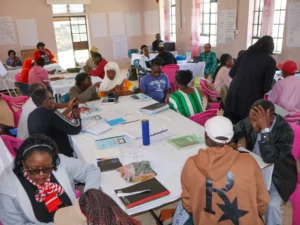
On the Second Day of the PFA Master TOT training, participants reinforced their facilitation skills, emphasizing the immediate needs of clients and those who need special attention in a crisis.
It was emphasized that it is essential to recognize that not all individuals require PFA interventions immediately.
Master trainers should emphasize assessing each person’s unique needs and resilience levels.
This approach ensures that support is provided appropriately without overwhelming those coping effectively.
Trainers can promote a more nuanced and practical application of PFA principles by tailoring their training to include strategies for identifying individuals who may not need immediate assistance.
This consideration fosters a balanced response, allowing resources to be allocated where needed while respecting the autonomy and resilience of those managing well independently.
The Master PFA trainees were informed of the need to emphasize the importance of assessing each person’s unique needs and resilience levels.
This approach ensures that support is provided appropriately without overwhelming those coping effectively.
Trainers can promote a more nuanced and practical application of PFA principles by tailoring their training to include strategies for identifying individuals who may not need immediate assistance.
As time progresses, delayed stress reactions can surface, revealing underlying vulnerabilities that were not immediately apparent.
PFA master trainees were informed on the importance of continuous monitoring and follow-up, ensuring that support systems remain accessible for those whose needs emerge later.
By fostering an environment of ongoing care and open communication, trainers equip practitioners to recognize and address these delayed responses effectively, ensuring that timely assistance is provided to individuals as soon as they require it.
This approach underscores the dynamic nature of psychological support, highlighting the necessity for adaptability and sustained attentiveness in PFA practices.
This consideration fosters a balanced response, allowing resources to be allocated where needed while respecting the autonomy and resilience of those managing well independently.
Recent studies suggest that while PFA effectively mitigates distress, its application should be nuanced, recognizing that not all individuals require immediate intervention.
This understanding prompts trainees to refine their assessment skills, ensuring support is tailored to individual needs.
By embracing these developments, PFA master trainees can enhance their training programs, promoting a more personalized and practical approach to crisis support.
In all these, facilitation skills are crucial in supporting these individuals by fostering an environment that respects their autonomy and acknowledges their resilience.
Facilitators can create a space where individuals feel safe expressing their experiences at their own pace by employing active listening and empathetic communication.
This approach honors the individual’s coping mechanisms and ensures that support is available for their needs.
Master trainers guide practitioners in honing these facilitation skills, enabling them to balance assisting with respecting an individual’s readiness to receive help.
This nuanced understanding ensures that PFA is delivered in a manner that is both effective and respectful, aligning with the core principles of PFA to offer humane, supportive, and practical assistance.
Incorporating debriefing facilitation practices becomes essential in such scenarios.
Debriefing offers a structured environment where individuals can reflect on their experiences, process emotions, and articulate challenges they may have previously overlooked.
Facilitators help uncover latent concerns by guiding participants through thoughtful questioning and active listening, fostering emotional resilience and clarity.
This approach ensures that even those who initially seemed unaffected receive the necessary support when they eventually confront the psychological impacts of their experiences.
Master trainees ought to emphasize the importance of debriefing as a dynamic tool that is adaptable to the evolving needs of individuals and ensures comprehensive care throughout the recovery journey.
By:Jacob Karani & Britney Marcella


